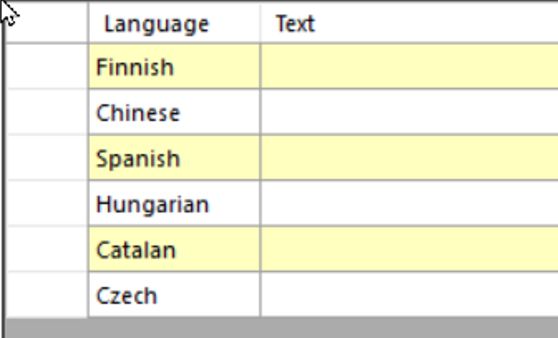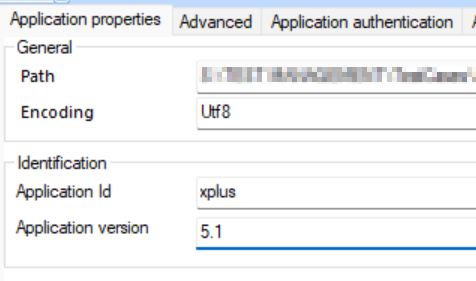Release notes 7.16 and 7.16.1
Below you'll find a brief overview of new functionality implemented in Axiell Designer 7.16.#, including links to more information. We usually recommend always using the latest version of Designer, but because using 7.16.1 breaks compatibility with older versions of Designer and versions of Collections older than 2.1.1, even if you do not implement new options, you may consider using 7.16 as long as your application doesn't require new Designer options. Using Designer 7.16.1 to change things in your application does mean that you’ll have to upgrade all your other Axiell software to their latest version too!
The Axiell software which needs to be updated to the latest version once new Designer settings have been applied or once you've started using 7.16.1 (only if you have a license for that software of course) is the following: Collections, AdMove server, Workflow client, Ingest, WebAPI, SDK, AnalyzeData, Migration, ConvertInternalLinks, IndexCheck, InternalLinkCheck, LinkRefCheck, RemoveLanguageFromData, RemoveTagsFromData, DBtool and ValidateDatabase.
Using new (Collections-only) Designer settings in your application and database definitions will always break compatibility with older versions of Designer and Collections and other Axiell software* using the same BaseAPI, although removing those new settings will often restore that compatibility under the condition that the SQL table structures haven't changed because of those settings: if the SQL table structures have changed too, then a SQL database backup from before that change is required as well to go back to the previous state. The Designer release notes always note the compatible version of Designer and Collections, but this applies to below list of other Axiell software too. For a full list of compatibility issues through the different versions of Designer and Collections, see the Axiell Designer compatibility topic. The Axiell software which needs to be updated to the latest version once new Designer settings have been applied (only if you have a license for that software of course) is the following: Collections, AdMove server, Workflow client, Ingest, WebAPI, SDK, AnalyzeData, Migration, ConvertInternalLinks, IndexCheck, InternalLinkCheck, LinkRefCheck, RemoveLanguageFromData, RemoveTagsFromData, DBtool and ValidateDatabase.
Designer versions older than 7.7.1.316 (at least down to some versions of 7.6) and specific version 7.8.0.3855 should not be used: changing the database server name in a specific .inf would empy all translations from all enumerative field definitions in that .inf. This would not affect your existing data, but enumerative fields (drop-down lists) in Collections would no longer show user-friendly values. In Designer 7.8.0.3859 this bug was fixed again.
Version 7.6.19234.1 (as recommended for Adlib for Windows users) doesn't have the bug, so it can be used safely by Adlib users.
If enumerative field definitions still have their neutral values while they have lost their translations due to this bug, all these translations should be copied back to the relevant field definitions manually, using a backup of your application or an appropriate model application if you do not have a backup of your own application. Please contact our helpdesk for further assistance.
New settings in Axiell Designer pertain only to applications run within an Axiell Collections environment. If such new settings are applied, then the resulting application can no longer (reliably) be opened in Adlib for Windows. Since development of Adlib for Windows has ceased quite a long time ago, these new options are not supported by Adlib for Windows. Even if Adlib would ignore the relevant option, you could no longer reliably work in Adlib too, so altered applications using Collections-only functionality should never be opened in Adlib again.
Import.exe and thus the Designer import job editor/manager (because Designer effectively calls import.exe when an import job is being run) need to be able to read the .inf of the target database for the import. This is only possible if this software recognizes all options and object properties that might have been set in the relevant .inf. If an option or property isn't recognized, running the import job returns an error 172 (system file processed with newer version of software than version with which it was called). With the late 2022 introduction of importtool.exe (using newer technology) as an alternative for import.exe and the Designer import function, development on the latter import functionality has ceased. This has the consequence that when you use import.exe or the Designer import job editor/manager to run an import job for an .inf that has new options (say those that were introduced from Designer 7.6 and up), there's a chance you'll get an error 172 because import.exe has no support for the new property. In that case you'll need to start using importtool.exe to run your import jobs from now on. However, as long as you don't get the error, you can keep running your import jobs as you always did and you can even use the latest version of Designer for any changes to your application. Just keep in mind that you may activate a new option or property sooner or later, after which import.exe or an import with Designer will throw the mentioned error and you'll still have to move to importtool.exe.
Import jobs still have to be created in Designer (preferably use the latest version), so that doesn't change. Read more about importtool.exehere.
Contents
7.16.1: Option for Czech translations added
7.16: Optional, much faster output for records with inheritance and/or context fields
7.16: Additional SQL tables for better search performance
7.16: Application version can now be registered in the PBK
2025-09-10: release notes Axiell Designer 7.16.1
We usually recommend always using the latest version of Designer, but because using 7.16.1 (build 8083 and up) breaks compatibility with older versions of Designer and versions of Collections older than 2.1.1, even if you do not use the new option to enter Czech translations (see below), you may consider using 7.16 as long as your application doesn't require new Designer options. Using Designer 7.16.1 to change things in your application does mean that you’ll have to upgrade all your other Axiell software to their latest version too!
The following new functionality for Designer 7.16.1 has been implemented:
Option for Czech translations added
In Axiell Designer 7.16.1 the different language text editors (to provide translations of application objects) now also offer Czech to allow adding Czech translations.

From Collections 2.1.1, the Czech language can now also be selected as the interface language.
2025-06-17: release notes Axiell Designer 7.16
The following bug fixes and new functionality for Designer 7.16 have been implemented:
|
Bug report no. |
Short problem description |
| AX-622 | The Application tester didn't report missing field definitions for backward reference fields. |
| AX-621 | Axiell Designers Application tester tool reported duplicate errors/warnings. |
| AX-618 | When free-text indexing an HTML field (using Designer, IndexTool or Collections), the HTML tags were included too, making it impossible to find records using the "equals" operator. To make sure an existing Free text index is fixed, we recommend you reindex this index using the current release version of Axiell Designer or Axiell IndexTool. |
| AX-615 | When importing unstructured XML with repeated fields, only the last field occurrence was imported. |
| AX-614 | After turning a reverse linked field using %0 as the link tag into an indexed link configuration and reindexing the index, an error showed repeatedly after a large part of the reindexing job was done. |
| AX-610 | ImportTool added an occurrence to a random multilingual field, with an empty language attribute. |
| AX-537 | Changes made in the index section of an .inf were not saved if it was the only area you accessed in that Designer session. |
| AX-462 | Application Browser: the file type drop-down for the Template path option for an output job definition didn't offer *.docx yet. |
Optional, much faster output for records with inheritance and/or context fields
For Export to Excel and output formats in Collections, the processing of records which have inherited fields (like maybe title fields in film archives) and/or context fields (like location fields) is quite demanding on system resources, causing output or export to Excel of such records to be rather slow. However, there's not always a need to output these fields, so that's why from Collections 2.1 the processing of inherited fields and context is automatically switched off for the Export to Excel function when the exported fields don't need this processing, giving a substantial performance boost. For output formats there cannot be automatic switching, but for output formats using adapl, a new adapl function called options, will allow you to switch the processing of inherited and/or context fields explicitly off (and back on again, if needed) at any point in the adapl.
The syntax of the options function is as follows:
Syntax
OPTIONS flag
Arguments
flag: integer
Meaning
Switches off the processing of inherited and/or context fields for output in a print adapl, boosting performance substantially for records which contain such fields. The switch can be inserted anywhere in an adapl and is active until adapl execution ends or until the processing of these fields is switched on explicitly again (with flag being zero). With the flag parameter you determine the specific feature(s) you want to switch off:
|
Flag |
Meaning |
|
0 |
Switches processing back on again (returning to normal) after having switched it off earlier in the adapl. |
|
1 |
Switches off data inheritance processing. |
|
2 |
Switches off the retrieval of context fields for hierarchically related fields. |
|
3 |
Combines flags 1 and 2, so this value optionally gives the greatest performance boost. |
Using this function in adapl requires at least Designer 7.16 or adapl.exe 7.6.25136.3 for compilation of the adapl and Collections 2.1 or up for compatibility.
Example
options 3 /* No inheritance needed, no context fields needed
Additional SQL tables for better search performance
Optionally, for better search performance of some types of searches, additional SQL tables can be added to your database using the Update SQL tables option. The relevant indexes added are:
-
nc_<database>_fulltext_tag_term_strippedterm_idx for all Full text enabled databases
-
nc_<database>_owner_idx for all databases
-
nc_<database>_record_access_role_priref_idx for all databases
-
nc_<database>_<index>_term_priref_idx for all hierarchical indexed fields for all databases (so in case of collect.nf, there’s the part/part_of relationship and for both fields part and part_of the SQL index table will be added)
(This improvement was possible thanks to a suggestion by Universal Music Group.)
Application version can now be registered in the PBK
Mainly intended for internal use, is the new Application version property on the Application properties tab of a selected .pbk file. We can use this property to register the version number of the application for future reference so that this information does not depend on the version number appearing in the title of the application, as specified on the Application titles tab.


